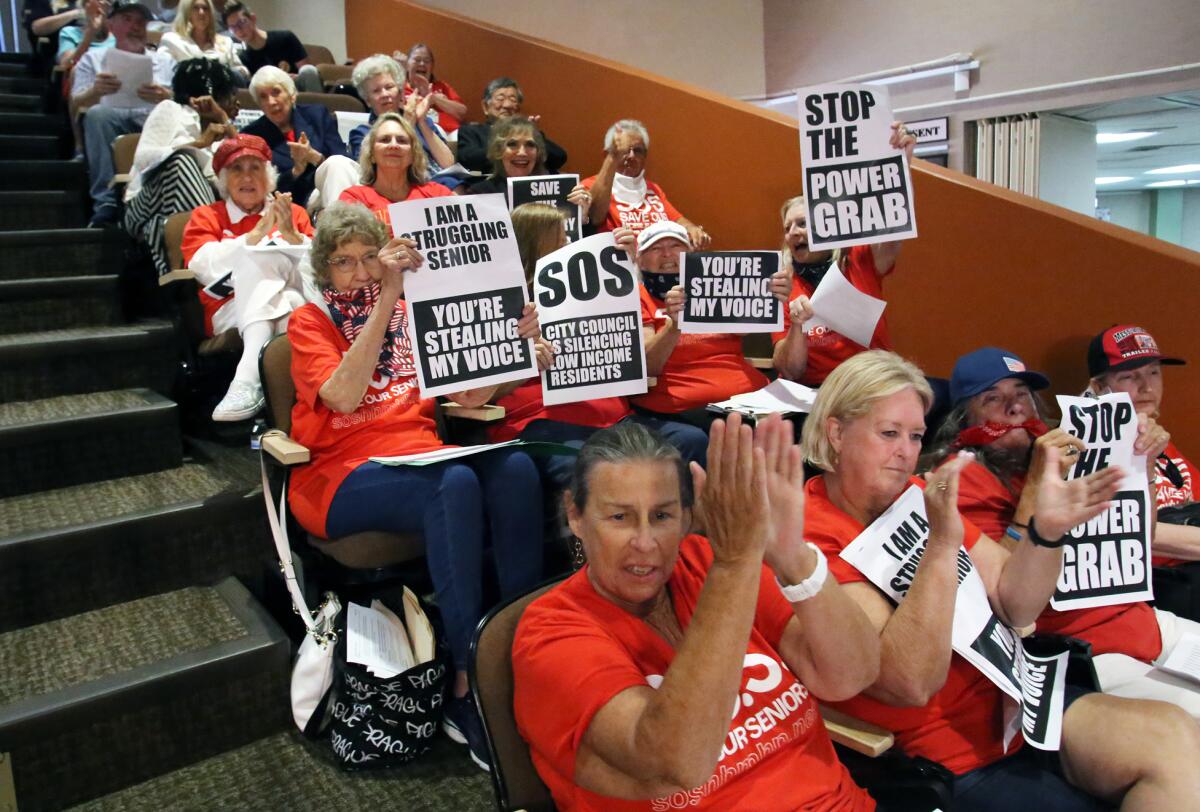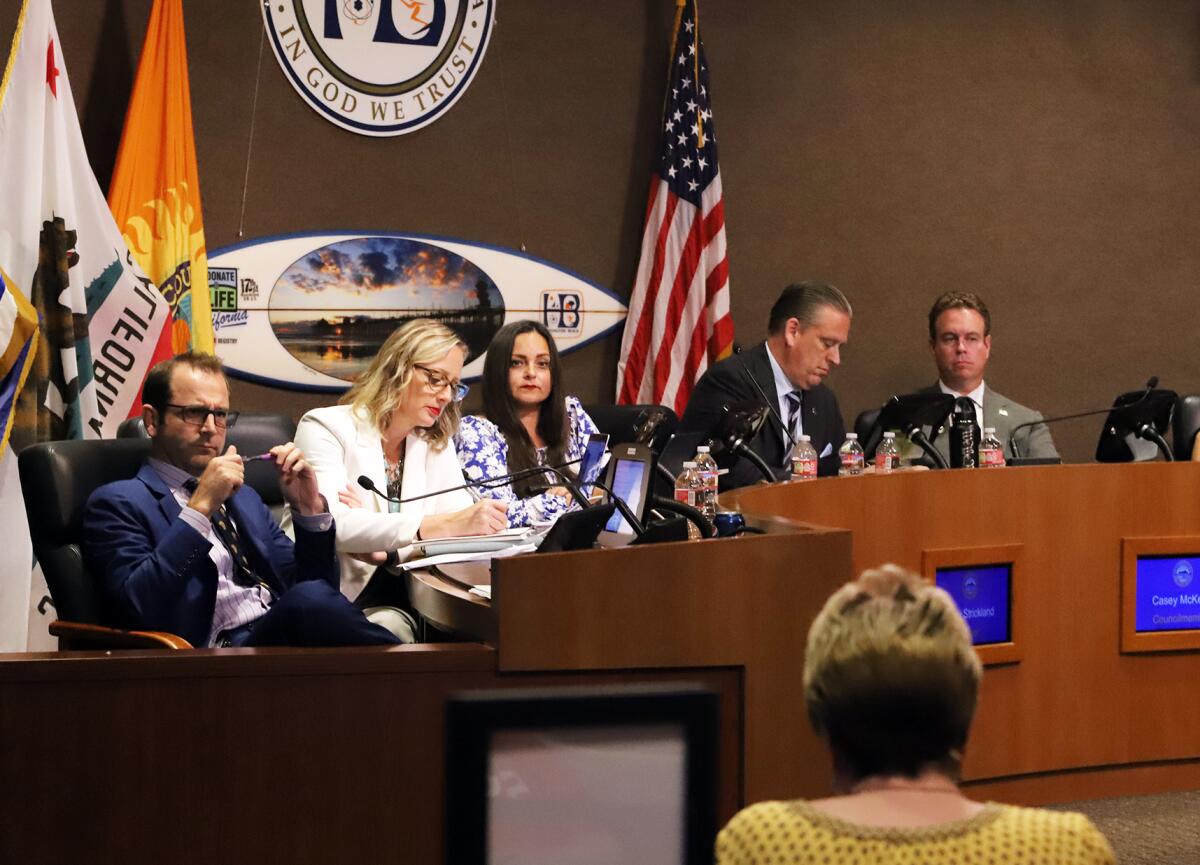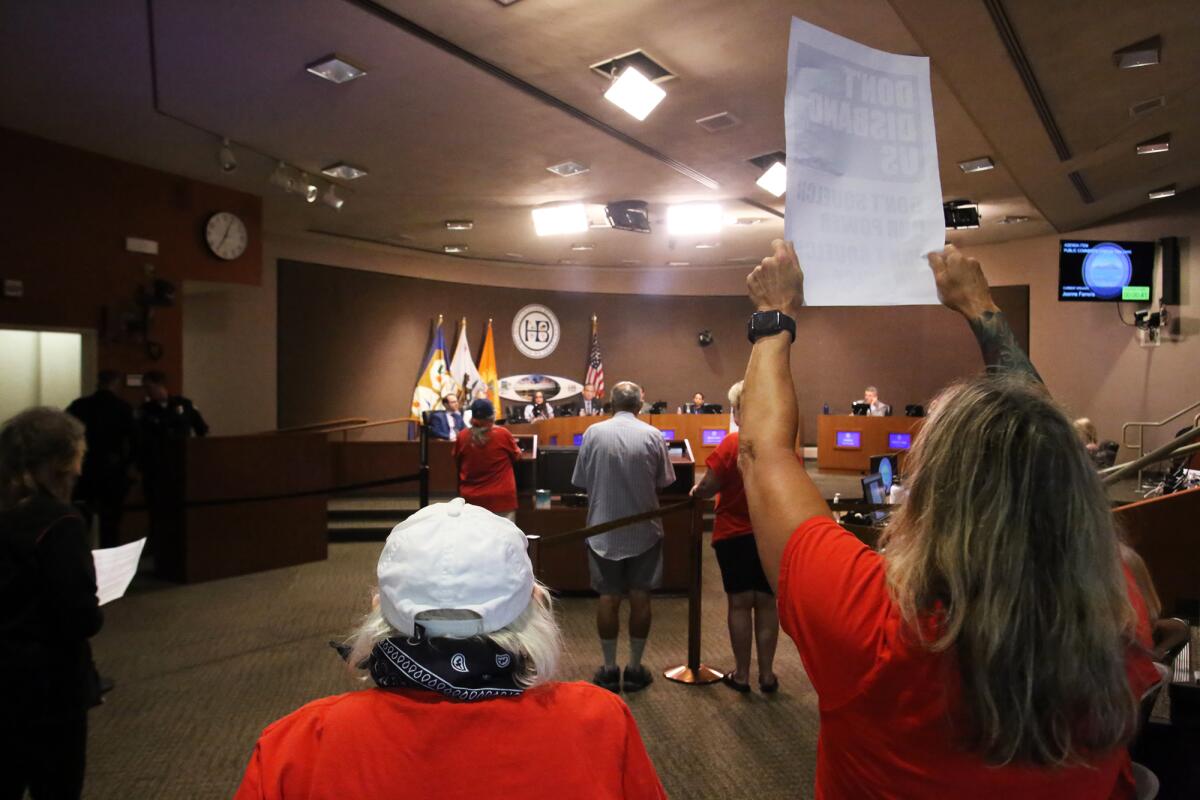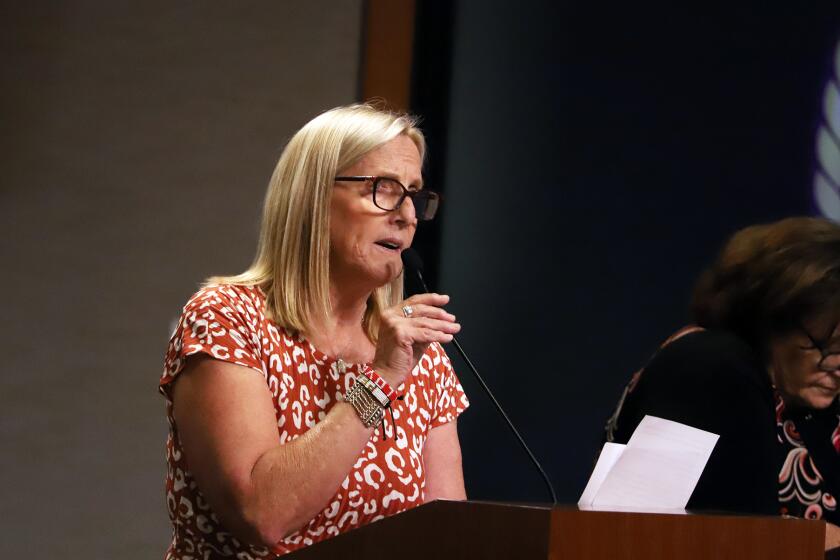Huntington Beach City Council cuts Human Relations Committee, others after decades of service

- Share via
During a contentious Huntington Beach City Council meeting Tuesday, several citizen-led committees and commissions were restructured, consolidated or dissolved at the recommendation of an ad hoc committee primarily composed of the same conservative majority council members who approved the changes.
As a result of the decision — which, in nearly all of nine separate votes taken resulted in the same 4-3 partisan split, with Democrats opposed — the city’s Human Relations Committee, Mobile Home Advisory Board and Jet Noise Commission will cease operations after a combined 61 years of operation.
For the record:
1:52 p.m. Aug. 3, 2023An earlier version of this story indicated the 1996 murder of a Native American man led to the formation of the Huntington Beach Human Relations Task Force. That attempted murder was one of two hate crimes that collectively spurred a citywide response.
Three council ad hoc committees, convened to advise on short-term home rentals, the city’s housing policies and cannabis regulations, will also be disbanded. Other groups will be reformatted or folded into other bodies, such as the Environmental & Sustainability Board, whose responsibilities will be absorbed by the Public Works Commission.
Mayor Tony Strickland sat on the three council-member committee with Mayor Pro Tem Gracey Van Der Mark and Councilman Pat Burns. The trio developed the recommendations after three closed door meetings with City Manager Al Zelinka and acting Asst. City Manager Travis Hopkins.

Aside from the assertion streamlining the groups’ operations would help save staff time and city money, no detailed explanation was provided to back up the recommendations.
“In all this it’s always what’s going to serve our community, the city of Huntington Beach, the best,” Burns said. “These are the recommendations we came up with and what’s going to serve the functioning of our government and the people.”
Strickland told residents the dismantling of the committees did not mean their attendant issues could not be addressed by other means, such as citizens forming nonprofit organizations or gathering around a cause and lobbying local lawmakers.
“Whatever we do here tonight, if those citizens want to meet together, they have the right to meet together,” he said. “We don’t have to have a committee to care about an issue.”
Not everyone agreed, however. Councilwoman Natalie Moser argued for retaining the Human Relations Committee, a task force formed after the 1994 murder of a Black man and the 1996 attempted murder of a Native American, both at the hands of white supremacists, and charged with upholding a “Declaration of Policy on Human Dignity,” that some on the council are also seeking to amend or discard.
Two of the amendments that the majority of the City Council favor relate to the elected city clerk position.
Committee members work with local police to review and follow up on local hate crimes and incidents, which have numbered 14 so far this year, according to police figures — twice the occurrences logged in all of 2022.
“Is this the right time to be dissolving a group that works to remedy that, that works to help repair and build those connections in the community?” Moser posed.
City staff indicated HBHRC’s efforts duplicate work being done by the Huntington Beach Police Department and the Orange County Human Relations Commission, now called Groundswell, in which the city retains membership at an annual cost of about $8,800.
Councilman Casey McKeon suggested members of the HBHRC had overstated the significance of the spike in hate crimes, which he said remain minimal relative to the city’s population, and urged the city to stay focused on governmental concerns.

“The narrow focus on these incidents perpetuates a false narrative that Huntington Beach is a divisive and hateful city,” he said.
Human Relations Committee member Debbi Parrott, speaking on behalf of herself, said the group works completely independently of Groundswell and hosts a number of community events throughout the year. Disbanding it, she said, only amplifies the perception that Huntington Beach is not a safe and welcoming place.
“Dissolving this committee shows that the value of safety for all, understanding one another despite differences, hearing all voices and building relationships between the community and the police department are not a priority,” Parrott said.
While a few public speakers supported the efforts to streamline city hall operations, several others, including residents who serve on the ousted groups, claimed the recommendations were made without public input.
Members of the city’s Mobile Home Advisory Board, which meet quarterly and represent about 3,000 residents, said the board’s City Council liaisons attended a July 24 meeting but gave no indication the group was on the chopping block.
“If you were honest, the elimination of the Mobile Home Advisory Board would have been on the agenda — it was not,” said MHAB co-president Sharon Crahill. “Which leads to the conclusion that a decision had already been made.”
Golden West geology professor Bud Benneman serves on the city’s Environmental & Sustainability Board, a group that’s been drafting a citywide sustainability master plan but will soon be consolidated with the already-consolidated Citizens Infrastructure Advisory Board/Public Works Commission.
Benneman said Tuesday although he politically supported those GOP council members who ran on a platform of stopping an erstwhile Democrat majority from forever revising city policies and regulations, their recent actions seemed hypocritical.
“[The Environmental & Sustainability Board] consists of professionals that actually work in the field and dedicate their time and opinions,” he said. “You basically have a gift right there, and to disband this board would be throwing away a great gift.”
All the latest on Orange County from Orange County.
Get our free TimesOC newsletter.
You may occasionally receive promotional content from the Daily Pilot.





